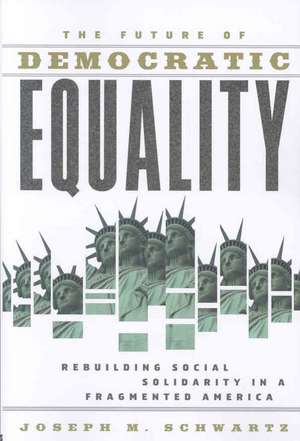The Future Of Democratic Equality: Rebuilding Social Solidarity in a Fragmented America
Autor Joseph M. Schwartzen Limba Engleză Paperback – 9 sep 2008
"The Future of Democratic Equality, by Joseph Schwartz, takes on three tasks, and accomplishes all brilliantly. Any one of these tasks well fulfilled would have been a laudable achievement. First, Schwartz argues for the centrality of the question of equality to democratic politics. Second, he critically analyzes and explains the shocking rise in inequality in the United States over the last three decades. This he does with conceptual clarity, rich interdisciplinary analysis, and a thorough examination of hard socioeconomic data. Third, he assails the near absence of concern for this soaring inequality among contemporary political theorists, and offers a cogent, and stinging, explanation that takes to task the discipline’s preoccupation with difference and identity severed from the pragmatics of democratic equality. The Future of Democratic Equality is a courageous and disciplined effort to tackle a hugely important political problem and intellectual puzzle. It well embodies the spirit of the Easton Book Award by providing well-grounded normative theory targeted to an urgent matter of contemporary concern. It is a must read for anyone who cares about democracy." - Respectfully submitted by Leslie Paul Thiele, University of Florida (chair) and Cary J. Nederman, Texas A&M University
Why has contemporary radical political theory remained virtually silent about the stunning rise in inequality in the United States over the past thirty years? Schwartz contends that since the 1980s, most radical theorists shifted their focus away from interrogating social inequality to criticizing the liberal and radical tradition for being inattentive to the role of difference and identity within social life. This critique brought more awareness of the relative autonomy of gender, racial, and sexual oppression. But, as Schwartz argues, it also led many theorists to forget that if difference is institutionalized on a terrain of radical economic inequality, unjust inequalities in social and political power will inevitably persist.
Schwartz cautions against a new radical theoretical orthodoxy: that "universal" norms such as equality and solidarity are inherently repressive and homogenizing, whereas particular norms and identities are truly emancipatory. Reducing inequality among Americans, as well as globally, will take a high level of social solidarity--a level far from today's fragmented politics. In focusing the left's attention on the need to reconstruct a governing model that speaks to the aspirations of the majority, Schwartz provocatively applies this vision to such real world political issues as welfare reform, race relations, childcare, and the democratic regulation of the global economy.
| Toate formatele și edițiile | Preț | Express |
|---|---|---|
| Paperback (1) | 430.37 lei 43-57 zile | |
| Taylor & Francis – 9 sep 2008 | 430.37 lei 43-57 zile | |
| Hardback (1) | 1332.11 lei 43-57 zile | |
| Taylor & Francis – 9 sep 2008 | 1332.11 lei 43-57 zile |
Preț: 430.37 lei
Nou
Puncte Express: 646
Preț estimativ în valută:
82.36€ • 85.50$ • 68.68£
82.36€ • 85.50$ • 68.68£
Carte tipărită la comandă
Livrare economică 24 martie-07 aprilie
Preluare comenzi: 021 569.72.76
Specificații
ISBN-13: 9780415944656
ISBN-10: 0415944651
Pagini: 240
Dimensiuni: 152 x 229 x 15 mm
Greutate: 0.32 kg
Ediția:1
Editura: Taylor & Francis
Colecția Routledge
Locul publicării:Oxford, United Kingdom
ISBN-10: 0415944651
Pagini: 240
Dimensiuni: 152 x 229 x 15 mm
Greutate: 0.32 kg
Ediția:1
Editura: Taylor & Francis
Colecția Routledge
Locul publicării:Oxford, United Kingdom
Cuprins
1. Introduction – Bringing "Difference" and "Identity" Back into the Study of Democratic Equality 2. From Domestic to Global Solidarity 3. Post-Structuralist Political Theory: Living in an Unreal World -- Where’s You? Me? Agency? 4. Can a "Politics of Difference" (or "Identity Politics") Ground a Radical Democratic Conception of Justice? 5. The Rise of Global "Casino Capitalism": Short-Term Financial Profit vs. Long-Term Equitable Growth 6. Does Globalization Necessitate the Demise of Democratic Egalitarian Politics? 7. Racism, Racial Politics, and Undemocratic "Difference": The Challenge for the Politics of Social Solidarity 8. Conclusion – Ending the False Antinomy of "Difference" and "Equality": Towards a Democratic Egalitarian Pluralist Politics
Recenzii
* * Winner * * The APSA David Easton Book Award 2011
'The Future of Democratic Equality is a courageous and disciplined effort to tackle a hugely important political problem and intellectual puzzle. It is a must read for anyone who cares about democracy.' – The David Easton Book Award Committee, 2011
"I think very highly of Schwartz’s work: he is one of the few theorists who is concerned with the unity of theory and practice." – Stephen Eric Bronner
2011 David Easton Award, presented for the best book by the Foundations of Political Theory section of APSA:
"The Future of Democratic Equality, by Joseph Schwartz, takes on three tasks, and accomplishes all brilliantly. Any one of these tasks well fulfilled would have been a laudable achievement. First, Schwartz argues for the centrality of the question of equality to democratic politics. Second, he critically analyzes and explains the shocking rise in inequality in the United States over the last three decades. This he does with conceptual clarity, rich interdisciplinary analysis, and a thorough examination of hard socioeconomic data. Third, he assails the near absence of concern for this soaring inequality among contemporary political theorists, and offers a cogent, and stinging, explanation that takes to task the discipline’s preoccupation with difference and identity severed from the pragmatics of democratic equality. The Future of Democratic Equality is a courageous and disciplined effort to tackle a hugely important political problem and intellectual puzzle. It well embodies the spirit of the Easton Book Award by providing well-grounded normative theory targeted to an urgent matter of contemporary concern. It is a must read for anyone who cares about democracy." - Respectfully submitted by Leslie Paul Thiele, University of Florida (chair) and Cary J. Nederman, Texas A&M University
"Joseph Schwartz is one of the leading progressive political theorists in the country. His recent book is a superb historical narrative and political analysis of both the undemocratic turn in American society and the anti-political turn in American academia. His radical democratic project avoids the pitfalls of a narrow politics of identity and an arrogant politics of old-style left solidarity—and it is powerful and propitious!"
--Cornel West, Princeton University
"In this excellent book, Joseph Schwartz provides what has been missing in recent political theory: a strong theoretical account of the causes of contemporary inequality and of the politics of citizenship and solidarity necessary to overcome it."
--Michael Walzer, Institute for Advanced Study
"Joseph Schwartz offers a brilliant critique of the failures of contemporary political theory to address the urgent quandaries of our time. In the process, he points in a direction that would once again place the problems of inequality and class at the center of theoretical inquiry. A welcome intervention indeed!"
-- Frances Fox Piven, Distinguished Professor of Political Science and Sociology, Graduate Center of the City University of New York
"The Future of Democratic Equality is an important book, and Schwartz succeeds in laying out a comprehensive and invigorating approach for challenging race-to-the-bottom forms of globalization. His book is both sharply argued and politically relevant, and attention to it is sure to benefit both the field of political science and the field of democratic politics itself."
—Erin E. O’Brien, University of Massachusetts Boston; reviewed in Perspectives on Politics
'The Future of Democratic Equality is a courageous and disciplined effort to tackle a hugely important political problem and intellectual puzzle. It is a must read for anyone who cares about democracy.' – The David Easton Book Award Committee, 2011
"I think very highly of Schwartz’s work: he is one of the few theorists who is concerned with the unity of theory and practice." – Stephen Eric Bronner
2011 David Easton Award, presented for the best book by the Foundations of Political Theory section of APSA:
"The Future of Democratic Equality, by Joseph Schwartz, takes on three tasks, and accomplishes all brilliantly. Any one of these tasks well fulfilled would have been a laudable achievement. First, Schwartz argues for the centrality of the question of equality to democratic politics. Second, he critically analyzes and explains the shocking rise in inequality in the United States over the last three decades. This he does with conceptual clarity, rich interdisciplinary analysis, and a thorough examination of hard socioeconomic data. Third, he assails the near absence of concern for this soaring inequality among contemporary political theorists, and offers a cogent, and stinging, explanation that takes to task the discipline’s preoccupation with difference and identity severed from the pragmatics of democratic equality. The Future of Democratic Equality is a courageous and disciplined effort to tackle a hugely important political problem and intellectual puzzle. It well embodies the spirit of the Easton Book Award by providing well-grounded normative theory targeted to an urgent matter of contemporary concern. It is a must read for anyone who cares about democracy." - Respectfully submitted by Leslie Paul Thiele, University of Florida (chair) and Cary J. Nederman, Texas A&M University
"Joseph Schwartz is one of the leading progressive political theorists in the country. His recent book is a superb historical narrative and political analysis of both the undemocratic turn in American society and the anti-political turn in American academia. His radical democratic project avoids the pitfalls of a narrow politics of identity and an arrogant politics of old-style left solidarity—and it is powerful and propitious!"
--Cornel West, Princeton University
"In this excellent book, Joseph Schwartz provides what has been missing in recent political theory: a strong theoretical account of the causes of contemporary inequality and of the politics of citizenship and solidarity necessary to overcome it."
--Michael Walzer, Institute for Advanced Study
"Joseph Schwartz offers a brilliant critique of the failures of contemporary political theory to address the urgent quandaries of our time. In the process, he points in a direction that would once again place the problems of inequality and class at the center of theoretical inquiry. A welcome intervention indeed!"
-- Frances Fox Piven, Distinguished Professor of Political Science and Sociology, Graduate Center of the City University of New York
"The Future of Democratic Equality is an important book, and Schwartz succeeds in laying out a comprehensive and invigorating approach for challenging race-to-the-bottom forms of globalization. His book is both sharply argued and politically relevant, and attention to it is sure to benefit both the field of political science and the field of democratic politics itself."
—Erin E. O’Brien, University of Massachusetts Boston; reviewed in Perspectives on Politics
Notă biografică
Joseph M. Schwartz is professor of political science at Temple University. He is the author of The Permanence of the Political, winner of the North American Society for Social Philosophy’s best book award.
Descriere
In a broad critique of contempororary radical political theory, Joseph Schwartz imagines a feasible, progressive, majoritarian, global politics in a post-industrial world. What would it look like, and how could we get there?






















